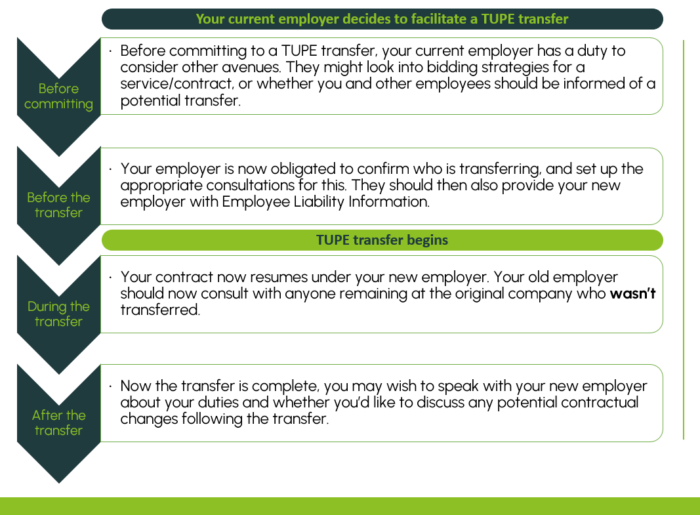What does TUPE mean?
TUPE stands for Transfer of Undertakings (Protection of Employment), and is essentially a way for you to be protected should the business you work for transfer to another owner, or be partially bought out. A ‘TUPE transfer’ happens when:
- An organisation, or part of it, is transferred from one employer to another;
- A service is transferred to a new provider, for example, when another company takes over the contract for office cleaning.
You may be affected by a TUPE transfer if:
- You’re transferring from your current employer to a new employer;
- Other employees are transferring to a new employer, but you stay employed with your current employer and do not transfer;
- Other employees have been transferred to the organisation you work for.
If your employer is having conversations about a TUPE transfer or is actively facilitating a TUPE transfer and you’re unsure about your rights, or how this might affect your role, we’ve got you covered. Our simple TUPE guide for employees outlines exactly how TUPE transfers work and what to expect, including the TUPE regulations your employer must adhere to during the process. The below guide is designed to provide guidance on TUPE transfers and regulations. However, if you believe your employer has breached TUPE regulations, and you think you might need legal advice, please don’t hesitate to call our team today.
1. Changes to TUPE employment law from 1st January 2024
Following Brexit, it was announced in mid-2023 that the government was consulting on its proposals to make changes to two areas of employment law that originated from the EU – one of them being the TUPE Regulations 2006. The changes, which came into effect from 1st January 2024, only impact businesses with fewer than 50 employees. The original rules stated that if your employer is instigating a TUPE transfer, then you must be consulted with (except if you work for an employer where the “micro-business exemption” applies, where there are fewer than 10 of you working there) via employee representatives. This exemption rule has now been widened, meaning your employer must consult with you directly (not through representatives) if your workplace has fewer than 50 employees. The government has said this rule change doesn’t seem likely to cause issues for employees. There is nothing different about the consultation process itself, and it may be a positive as these conversations may be able to happen sooner.
2. How it works: the TUPE process
TUPE transfers occur in stages, which we’ve outlined in the graphic below:  You won’t need to do anything as part of the transfer. Your current employer and new employer should handle everything and make sure you’re consulted as part of the process.
You won’t need to do anything as part of the transfer. Your current employer and new employer should handle everything and make sure you’re consulted as part of the process.
3. Your TUPE legal protection
- Providing the business you work for is not insolvent, you will be given the following TUPE legal protection:
- You will be protected against dismissal;
- You will receive a consultation, either from your employer directly or via employee representatives (as above);
- You will automatically be transferred to your new employer depending on the type of transfer;
The terms and conditions of your employment will be preserved.
4. Types of TUPE transfers
There are two types of transfers protected by TUPE regulations – a business transfer or a service provision change. You can read more about these types of TUPE transfers below:
Business transfer
Regulation 3(1)(a) explains this as: “a transfer of an undertaking, business or part of an undertaking or business situated immediately before the transfer in the UK to another person where there is a transfer of an economic entity which retains its identity.” But what does this mean for you as an employee? When the transfer happens, all employees of the business being transferred are automatically moved over, including the terms and conditions of your employment contracts. Although it is your legal right to transfer with your previous contractual terms, there may be special circumstances that don’t apply with regard to pensions. If you take your employer to court for breach of TUPE regulations, the following factors will be considered:
- The type of undertakings that are being transferred and whether these include assets such as buildings or mobile property;
- Whether any clients/customers of the business have been transferred;
- Whether you have been transferred and the terms and conditions of your contract kept in place;
- Any intangible assets that are being transferred, such as patents and trademarks;
- The correlation between the activities carried out prior to and after the transfer.
Service provision changes
SPCs, or service provision changes, relate to the following three elements:
- Outsourcing;
- Second generation outsourcing/re-tendering;
- Insourcing.
1. Outsourcing
This is where a role that is usually carried out internally to the business (for example, financial adviser) is “outsourced” to an external contractor.
2. Second generation outsourcing/re-tendering
Where a role carried out by an external contractor is given to a different contractor instead, through second generation outsourcing and/or a re-tendering process. There may be a few reasons for a business to go through this process; the contract is ending and they wish to explore more cost-effective options; they have had a negative experience with the current contractor; the current contractor is ceasing trade.
3. Insourcing
Where a role carried out by an external contractor is brought in-house to be carried out by the client instead. Whether or not this role was previously in-house prior to being completed externally does not matter in this scenario. SPCs can be complex, so it’s important to seek legal advice if you feel your employer has breached TUPE regulations. When determining if an SPC has happened, your solicitor will need to check certain requirements were met, such as the identification of activities that describe the role/service and the identification of employees involved. NOTE: It’s important to note that public sector business transfers aren’t normally covered by TUPE law, but there may be some exceptions to this regarding public sector businesses moving into the private sector.
5. When does TUPE apply?
The rules of a TUPE agreement apply to you if you are:
- Legally an employee of the business undergoing the transfer;
- The transferring part of the business is based in the UK.
When does TUPE not apply?
TUPE regulations would not apply if an external service provider’s contract was (as listed above):
- Re-tendered
- Outsourced
- Insourced
- Transferred
For example, a caterer or cleaner who is employed by a business on a contractual basis wouldn’t be protected by TUPE if that business didn’t renew the contract and sought the service elsewhere. There are also scenarios with public sector organisations changing hands but remaining in the public sector, which wouldn’t be protected by TUPE law. The question of TUPE regulations not applying or applying can be confusing, and if you’re in a transactional situation where you’re unsure, it’s always best to seek the advice of legal experts. To go through a TUPE transfer, you must be part of an ‘organised grouping of employees’. This group is the individuals who carry out the work for the organisation going through the transfer.
What if only part of my job is being transferred?
If only part of your role is going through the TUPE transfer of employees, the rules of the TUPE agreement will apply if you are part of that organised group of employees. The organisation that you do the work for must remain the same for TUPE regulations to apply. If you’re unsure as to whether you are part of an organised group of employees, we recommend you speak with your employer and ask them to clarify. If you think they are in breach of any rules or aren’t being clear with you, feel free to reach out to our team who can help.
6. Your TUPE consultation
Your employer has a legal obligation to consult you on any TUPE transfer taking place that affects your role. As mentioned further up in this guide, if you work for a company with fewer than 50 employees, you will be consulted by your employer directly. If you work for a company with more than 50 employees, it is likely you will be consulted with via elected employee representatives or a trade union.
7. Transferring across to your new employer
If you are transferring across to a new employer, your contract will continue with your new employer. It’s important to note that this is because your contract is not being ended by your current employer, and is instead simply being moved across. During this process, there is a requirement that your current employer provides your new employer with all ‘employee liability information’. This includes:
- Age;
- Identity;
- Terms and conditions of your employment (more on this below)
- Any agreements that you previously reached with between your employer and a trade union, if applicable;
- Any records of grievances and/or disciplinary from the last two years;
- Any claims you made against your employer within the last two years.
Any claims you made against your employer within the last two years.
What happens if I don’t want to transfer?
You can, of course, refuse to transfer, but you will forfeit your right to claim for redundancy or unfair dismissal. You should consider all of your available options before making a firm decision. Our team will be able to help you if need – and if you still decide not to transfer across, you should let your employer know in writing. This will be treated as a standard resignation and your employer will let your new employer know that you won’t be transferring. We recommend speaking with your employer early on in this process, as they may have a different route available for you to take. There might be an alternative job on offer, and if you accept, your length of service will continue providing you start the role before the TUPE transfer takes place. If you do not accept an alternative role, or your employer doesn’t offer you one, your employment stops on the date of the TUPE transfer. If the transfer goes through prior to your notice period ending you won’t need to work after the date of the transfer. Once the transfer begins, your new employer becomes responsible for your employment contract. They must also inform you, in writing, that you have had a change of employer.
If I refuse to transfer, to which employer should I submit my resignation?
If you decide to refuse the TUPE transfer and resign, you’ll need to tell your new employer in writing.
If I have a bad attendance or disciplinary record, can my new employer refuse to accept me as part of the TUPE transfer?
No. If you are still an employee of your original employer despite your record, your new employer will need to accept you as part of transfer and continue to employ you under the same contract you had before. They will be made aware of your record as it forms part of the information your current employer is legally obliged to disclose ahead of a transfer. The only way a new employer can refuse you during a TUPE transfer is if there is an Economical, Technical or Organisational (ETO) reason for doing so. Even then, you may be eligible to claim unfair dismissal.
TUPE changes to terms and conditions
The terms and conditions of your employment automatically transfer to your new employer during a TUPE transfer. Terms and conditions of your employment may include:
- Your wage or salary including any overtime;
- Commission and/or bonuses;
- Sick leave and sick pay;
- Holiday leave entitlements and pay;
- Any other allowances;
Your new employer will be responsible for paying your overtime, bonuses and any outstanding wages after the TUPE transfer. As an employee, you might sometimes enjoy a range of non-contractual benefits. Where the benefit is wholly discretionary, then your transferee employer may not continue to provide it after the transfer. However, your employer should exercise some caution before withdrawing discretionary benefits completely, because of the possibility of a breach of the implied mutual duty of trust and confidence. There is also the possibility that your discretionary benefit may have become contractual through custom and practice. Any pension payments you’ve made prior to the date of the transfer will be protected. Your pension will transfer over to your new employer if it is classed as a personal pension (that you have arranged yourself). A workplace pension won’t be moved across because it sits outside of TUPE regulations. Your new employer must provide you with a suitable alternative pension scheme, and match your contributions from your old employer up to a maximum of 6%.
8. Redundancies after TUPE transfers
Sometimes, your new employer may decide the organisation is not structured in the best way following a TUPE transfer. While you are protected from unfair dismissal due to a TUPE transfer, there is nothing stopping your new employer from making roles redundant if they have established a reason for this other than the TUPE transfer. After you have transferred, your new employer can only make redundancies related to the transfer if there is both:
- A genuine redundancy situation, and;
- A need to make changes to the workforce for economic, technical or organisational (ETO) reasons.
For example, an ETO reason could be:
- A change in the location of work;
- A reduction in the number of employees;
- Too many employees transferred in for the same role.
If the reason for redundancies is not related to the transfer, your employer can make redundancies following the normal redundancy process and does not need an ETO reason.
9. Myths and facts about TUPE transfers
Myth 1: I can’t go through TUPE when on maternity leave
FALSE. If you are on maternity leave or paternity leave, you should be included in the consultation process before a TUPE transfer takes place. This myth would only be true if you didn’t plan on returning to your employer after your maternity or paternity leave. As long as you plan on continuing to work for your employer after your parental leave, you will still be included in the TUPE process.
Myth 2: I have the right to take redundancy if I refuse TUPE
FALSE. You can refuse a TUPE transfer, but you cannot choose redundancy as an alternative. This is because your employment is not ending as a result of the transfer – the expectation is that your role will continue under your new employer. If you do not wish to be part of the transfer, you could consult with your employer about finding you a different role elsewhere in the organisation. Otherwise, your employment will effectively end on the date of the transfer if you object to it.
Myth 3: I can’t change my contract before the TUPE transfer, but I can afterwards
TRUE. Your contract cannot be changed before the transfer happens. But, that doesn’t mean changes can’t be made after the transfer with your new employer.
Get legal advice on TUPE today
If your employer is instigating a TUPE transfer, and you’re uncertain about your rights or wish to speak with someone for further legal advice on TUPE, our employment law experts are here to help.
Our Related Services
- Dismissal From Work
- Settlement Agreements
- Discrimination At Work
- Employment Tribunal Claims
- Equal Pay Disputes
Download Our Free TUPE Q&A Document Today
If you want to read more about TUPE and have a look at some frequently asked questions, we recommend downloading our TUPE Q&A document here.
We understand you may have further questions about this employment process, so we’ve broken some of the common questions down into an easy, downloadable document that you can keep with you should you need to refer to it during a TUPE consultation at your place of work.





